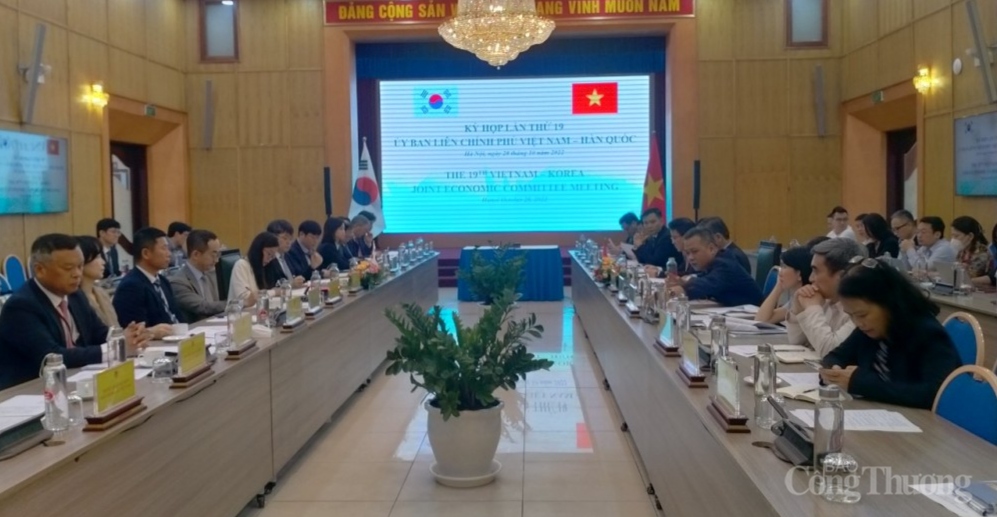Vietnam, RoK make great strides in multifaceted co-operation
VOV.VN - Recent years has seen co-operative ties between the nation and the Republic of Korea (RoK) enjoy stead growth across various fields, with ties expected to prosper in the time ahead.

This comment was made during the 19th meeting of the Vietnam-RoK Intergovernmental Committee on Economic and Scientific and Technical Cooperation on October 28, co-chaired by the Vietnam Ministry of Planning and Investment and the Ministry of Foreign Affairs of the Republic of Korea.
The main objective of the meeting was to review bilateral co-operation in different fields following on from the previous meeting, as well as outlining orientations for future co-operation. Specifically, the two sides discussed a range of solutions aimed at ramping up co-operation in trade, investment, development, labour, and social affairs.
According to details given by the Ministry of Planning and Investment, joint co-operation has continued to see strong development across multiple fields.
This year marks the 30th anniversary of the two countries’ diplomatic relations and development ties, thereby bringing mutual benefits and understanding, as well as trust to both sides.
Regarding trade, Nguyen Duy Kien, deputy head of the Division of Northeast Asia and South Pacific under the Ministry of Industry and Trade, said that in 2021 the RoK was the country’s third largest trading partner, behind only China and the United States, with bilateral turnover reaching US$78 billion, up 18.2% on-year.
The East Asian nation represents the nation’s fourth largest export market and the second largest import market.
The Ministry of Industry and Trade reported that the past nine months of this year saw Vietnam-RoK trade turnover hit US$66.8 billion, marking an annual rise of 18.2%. If this growth rate is successfully maintained, both sides are likely to fulfill the turnover target of US$100 billion by 2023 as set by the two countries' senior leaders.
Regarding foreign direct investment, Do Van Su, deputy director of the Foreign Investment Agency under the Ministry of Planning and Investment), outlined that as of September, the RoK has run 9,438 valid investment projects in Vietnam, with a total registered capital of US$80.5 billion. This means the RoK ranks first in terms of total registered investment capital and total number of projects in the nation.
In line with this, Korean enterprises continue to be an important component of the Vietnamese economy, contributing roughly 30% to the country’s total export value.
Speaking at the event, Korean Deputy Foreign Minister Yun Eeong-deok also shared the difficulties and obstacles faced by some Korean enterprises when taking part in the local investment process, while asking the Vietnamese side to remove them in order to facilitate Korean businesses.
On this basis, the Ministry of Planning and Investment said that the country will support and create the best conditions possible for Korean enterprises to make new investments and expand production and business activities.
Along with removing difficulties and obstacles faced by Korean investors, the Ministry of Planning and Investment also suggested that the Korean Government encourage major Korean groups to invest in priority areas of the Vietnamese Government. This includes high technology, electronics, renewable energy, infrastructure development, construction of specialized technology complexes, development of high-quality agricultural, and industrial park infrastructure.
Regarding official development aid, Pham Hoang Mai, director of the External Economic Affairs Department under the Ministry of Planning and Investment, said that the country continues to be the top priority partner that RoK provides development assistance to , with the nation receiving about 20% of total Korean aid.
Recently, the RoK’s total aid to the nation exceeded US$500 million annually, of with 90% coming from ODA and 10% is non-refundable aid.
Vietnam-RoK development co-operation therefore gives priority to transportation and urban infrastructure; health, education and training, the environment, clean energy, and information technology.
Aside from ODA, the RoK is also willing to provide preferential credits through the framework of financial co-operation to support the country in implementing large-scale infrastructure projects.
Moving forward the nation will continue to ask the Korean side to provide ODA and concessional loans as part of Vietnamese efforts to further relax bidding conditions for projects, therefore directing Korean aid to Vietnamese priority project areas. In addition, both nations agreed to discuss and prepare for the Framework Credit Agreement on ODA loans for the 2014 to 2028 period.
Concerning labour co-operation, there are currently more than 37,000 workers under the Employment Permit Program for Foreign Workers in the RoK across four sectors, including manufacturing, construction, agriculture, and fishery.
However, the main problem in labour ties between the two countries is that many Vietnamese workers with expired contracts do not return home and many instead choose to stay illegally in the host nation.
Recently, with joint efforts made by both sides and with a range of measures implemented, the number of workers residing and working illegally in the RoK has seen a gradual fall.
Along with these areas, the 19th session also discussed ways to solve pending problems and bolster cooperation in the fields of industry, energy, transport infrastructure, construction, and finance - banking.
Future efforts will see the two sides continue to strengthen exchanges, information sharing, and improve capacity. Accordingly, the RoK’s experience and capacity are strengths that Vietnam must actively exploit.
